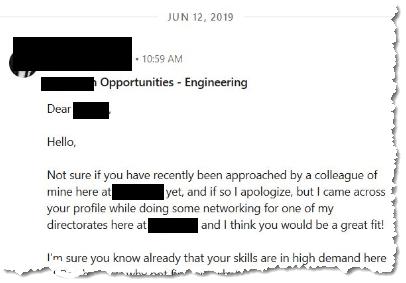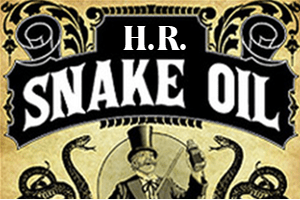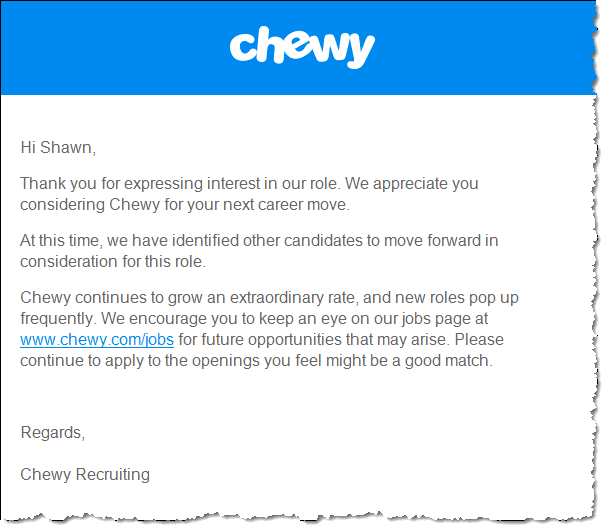Question
I’m a third party recruiter and I refuse to bend over and appease any HR department that insists on a jealous stranglehold over hiring decisions. As proven by their public website, this company’s HR department has made itself the one and only gateway through which employment is granted. Such policies about recruiters are how internal HR politics often eliminate A-player candidates.
Attention Staffing Agencies/Recruiters:
Please do not correspond with, or in any way solicit, any individual [Company name redacted] employee, including hiring managers, regarding our current open positions or staffing needs. All communication should be directed to [HR e-mail]. Any and all resumes submitted by Search Firms or Employment Agencies to any employee at [Company] via-email, the internet, or in any form and/or method will be deemed the sole property of [Company], unless such business(es) were engaged by [Company] for this position, and a valid written agreement has been executed with [Company] and is in place. In the event a candidate who was submitted outside of [Company]’s agency engagement process is hired, no restitution of a fee or payment of any kind will be exchanged.
I think this is very bad news for headhunters and job seekers alike. What a disaster.
This is why more and more “recruiters” use the random “resume flood” method of candidate submission. Much of the industry has fallen victim to worshipping throwing darts at the board all due to HR’s failed policies.
Nick’s Reply
 Before I address your ire, I want to explain why this problem is relevant to all job seekers: Know how frustrated and upset you get when a recruiter gets you on the hook about a “perfect” job — then the “opportunity” goes nowhere? Some of the time, it’s because the recruiter has no contract with the employer, and thus no authorization, to submit candidates like you. The employer simply refuses to interview you. And the recruiter is simply using the job as bait to gather more information about you so they can submit you for other jobs that aren’t so perfect and waste more of your time.
Before I address your ire, I want to explain why this problem is relevant to all job seekers: Know how frustrated and upset you get when a recruiter gets you on the hook about a “perfect” job — then the “opportunity” goes nowhere? Some of the time, it’s because the recruiter has no contract with the employer, and thus no authorization, to submit candidates like you. The employer simply refuses to interview you. And the recruiter is simply using the job as bait to gather more information about you so they can submit you for other jobs that aren’t so perfect and waste more of your time.
Recruiters without contracts: bad business
Employers routinely require a contractual agreement with a search firm or agency (aka, recruiter, headhunter) before they will pay a fee for candidate referrals. That’s a common policy and I think it’s actually a good thing for headhunters that want to deal with this company. I don’t see how it’s a disaster. A contract avoids friction between headhunters and employers — friction that can hurt the naive, unsuspecting job seeker. Unfortunately, even some of the most sophisticated job seekers don’t understand this problem.
The notice you shared above clearly says the company works with headhunters and outside employment agencies, but requires a contract to be in place. What this policy does is exactly what you bemoan. It blocks recruiters that use “the random resume flood method of candidate submission” that wastes everyone’s time. It sounds like you don’t have a contract with this company — or why would you be complaining about it?
The policy is also good for job seekers. By locking out unapproved recruiters, a job seeker interested in working at this company faces less competition. (See A headhunter locked me out of jobs for 6 months.)
As a headhunter, I’m not a fan of conducting business through the HR office. This means I prefer to work with companies where HR serves in a primarily administrative role in recruiting. I deal directly with the hiring manager, and I still have a written contract with the company. That’s just good business. Why would I chance delivering my valuable services without assurance I’ll be paid?
Headhunting is not a free-for-all
Headhunters that submit resumes to employers without a contract in place put everyone involved in jeopardy.
It’s actually good for a headhunter when a company requires engagement contracts. It prevents headhunting (or recruiting, if you prefer) from turning into a free-for-all. It makes it easier to work with the company (whether it’s with HR or a hiring manager) because you’re not competing with unapproved recruiters spamming the company with “resumes” they found online.
That policy statement seems directed at recruiters the company doesn’t do business with. It doesn’t mean approved headhunters are forbidden to call and talk with hiring managers. Of course, if this is a case where HR still tries to keep the headhunter and the hiring manager apart, then it’s time for the authorized headhunter to fire the client. Most of the time the only problem is unauthorized headhunters insisting on submitting candidates to an employer.
I don’t like HR roadblocks, but the reality is, a company can use any rules it wants to, and the headhunter is free to take great candidates to the company’s competitors instead.
Job seekers, pay attention!
There is an important lesson here for job seekers. You know as well as I do that recruiters often waste your time after they ply you with solicitations to consider a certain job. One reason is that the employer in question has no contract with that third-party recruiter. An unauthorized submission of your resume could waste your time with unauthorized interviews that go nowhere, and even kill any chance you have for a job at that company.
This contract problem also reveals itself at the job offer stage. The employer may decide to set aside the recruiter’s lack of a contract because the hiring manager really wants to hire you anyway. Your problem is that the recruiter has no pull with the employer to negotiate the best deal for you. As a drive-by opportunist, this non-contracted panderer just wants a quick fee, not the best deal for both sides.
Vet recruiters
My advice: Vet all recruiters. Ask a headhunter that solicits you for proof that they are authorized to recruit for the employer in question. You could even check yourself, by contacting the company’s HR department before you agree to do anything else. (If the headhunter is indeed approved, don’t then try to apply for the job directly. That’s slimy and will probably get you into trouble.)
As you can see, this kind of friction between third-party recruiters and employers can hurt you. No one really talks about this, and that’s why I took some time to cover it here. Be careful. Don’t step into a mess. (See Recruiters: Raise your standards or get out. For thorough coverage, check out How to Work With Headhunters and how to make headhunters work for you.)
Job postings and resumes are essentially free for the taking online. There’s nothing to stop anyone from trying to earn a placement fee by contacting you about a job they saw online (without the employer’s approval) or from “submitting” your resume — which they found online — without your approval. This practice doesn’t make anyone a headhunter. Just a fast-buck artist.
Has an unsavory “headhunter” ever put you in a bad spot with an employer? If you’re a headhunter, what’s your position on having a contract with your clients? And I’d love to hear from HR folks. How do you handle unsolicited applicant submissions from headhunters that have no contract with you?
: :




 An acquaintance just got her first job after being a stay-at-home mom for many years. She’s a recruiter. Salary? $10 an hour.
An acquaintance just got her first job after being a stay-at-home mom for many years. She’s a recruiter. Salary? $10 an hour.


 Source: Motherboard | Vice
Source: Motherboard | Vice
 20 HR recruiters from one [big-name defense contractor] contacted me via LinkedIn during 2019. One of them contacted me twice in two weeks, with the exact same message: Send me your most recent resume. She clearly didn’t know she had contacted me already. Others used the same message. I never heard from 19 of them again.
20 HR recruiters from one [big-name defense contractor] contacted me via LinkedIn during 2019. One of them contacted me twice in two weeks, with the exact same message: Send me your most recent resume. She clearly didn’t know she had contacted me already. Others used the same message. I never heard from 19 of them again.





 HR is paying for an ATS [applicant tracking system] to store/file what’s coming through the pipeline. They are already sitting on a pile of resumes. Why not just turn the spigot off, and contact the people you already have in your pile?
HR is paying for an ATS [applicant tracking system] to store/file what’s coming through the pipeline. They are already sitting on a pile of resumes. Why not just turn the spigot off, and contact the people you already have in your pile? I joined my company six years ago mainly because every manager and employee I met impressed me. For the first couple of years, we were wildly successful. I’m convinced it was because of the people. As a manager, I am careful to hire only people who match that caliber. But things changed. A mediocre vice president was hired who brought in two managers who were not technically competent. They in turn hired weak staff. Customers started complaining.
I joined my company six years ago mainly because every manager and employee I met impressed me. For the first couple of years, we were wildly successful. I’m convinced it was because of the people. As a manager, I am careful to hire only people who match that caliber. But things changed. A mediocre vice president was hired who brought in two managers who were not technically competent. They in turn hired weak staff. Customers started complaining. Question
Question


 Is it acceptable to bypass the standardized job boards and HR resume processing, to seek a direct communication with the company? By acceptable, I mean will it hurt my standing with the hiring facilitators?
Is it acceptable to bypass the standardized job boards and HR resume processing, to seek a direct communication with the company? By acceptable, I mean will it hurt my standing with the hiring facilitators?